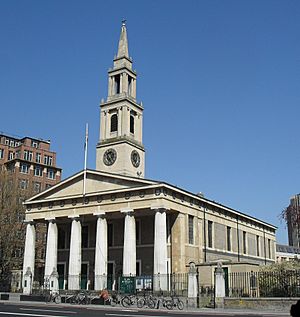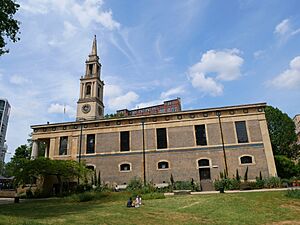St John's Church, Waterloo facts for kids
Quick facts for kids St John's Church, Waterloo |
|
|---|---|

St John's Church in 2010
|
|
| Location | Waterloo Road, London |
| Country | United Kingdom |
| Denomination | Church of England |
| Churchmanship | Liberal Catholic |
| History | |
| Status | Active |
| Founded | 1822 |
| Dedication | St John the Evangelist |
| Dedicated | 3 November 1824 |
| Architecture | |
| Functional status | Parish church |
| Architect(s) | Francis Bedford |
| Years built | 1822–1824 |
| Administration | |
| Parish | Waterloo, St. John with St. Andrew |
| Deanery | Lambeth North |
| Archdeaconry | Archdeaconry of Lambeth |
| Episcopal area | Kingston Episcopal Area |
| Diocese | Diocese of Southwark |
St John's Church, Waterloo is a historic church in South London, England. It was built between 1822 and 1824. The church was designed by an architect named Francis Octavius Bedford. It is dedicated to St John the Evangelist. Along with St Andrew's, Short Street, it serves the local community.
Contents
Where is St John's Church?
The church is located in the Waterloo area of London. It is across from the London IMAX cinema. It is also very close to Waterloo train station. A campus of King's College London is nearby too.
Back in 1818, after the Napoleonic Wars, London's population was growing fast. The government decided to spend money to build new churches. About £64,000 was set aside in 1822 for the Lambeth area. They chose to build a new church near the Waterloo Bridge. The land was bought from the Archbishop of Canterbury.
History of St John's Church
Building the Church
The Church of St John was designed by Francis Octavius Bedford and finished in 1824. Bedford designed three other churches in a similar style. This style is called Greek Revival. It was inspired by ancient Greek buildings. Bedford was known for his knowledge of Greek history and art.
At the time, some critics didn't like the Greek Revival style for churches. They preferred the Gothic style. However, St John's Church was more appreciated. People liked its spire, which blended classical details with a traditional English church shape.
The ground where the church was built was very wet and swampy. There was even a pond there. John Rennie the Younger, a famous engineer, was asked for advice. He suggested using strong wooden piles under all the walls. This made the foundation very strong. Even after being bombed and exposed to weather for years, the walls remained solid. This allowed them to be used in the church's restoration.
The Churchyard Garden
In 1877, the churchyard was turned into a garden. In 1883, Lord Brabazon helped create a children's playground there. It had swings and other equipment. Over the years, the garden became neglected. However, it has since been restored. The playground equipment is no longer there.
Restoration and Rebuilding
The church was renovated in 1885 by Reginald Blomfield. Its inside was changed again in 1924 by Ninian Comper.
During World War II, in 1940, a bomb hit the church. The roof and much of the inside were destroyed. Services then moved to the church's underground area, called the crypt. The church was known as "St John's-in-the-crypt" for a while. The damaged building stood open for ten years.
In 1950, the church was restored and redesigned inside by Thomas Ford. In 1951, it was rededicated as the "Festival of Britain Church." This was because it was restored around the time of the Festival of Britain, a big national exhibition.
Thomas Ford removed the upper seating areas (galleries). He added new decorations with Greek patterns, gold, and light colors. A large painting (mural) by Hans Feibusch was added behind the altar. Two paintings by David Morris were also displayed. These changes made the inside look very different from before.
The church's organ was originally built in 1824 by Bishop & Sons. It was badly damaged by the bombing. In 1951, Noel Mander restored it. The church also has a set of 8 bells. All of them were made in 1825 by Thomas II Mears at the Whitechapel Bell Foundry.
Modern Challenges
During the building of the Jubilee line for the London Underground, the church's stability was watched closely. The soil under the church started to dry out. To stop the church from collapsing, millions of gallons of water had to be pumped into its foundations. This shows how important the original piling work was.
The church had another big restoration of its main hall and crypt in 2021–2022. This work was led by Eric Parry Architects. There was some disagreement about the plans. Some groups felt that important features from the 1950s restoration would be lost. After discussions, the work was done with some changes. Some features, like the pulpits and altar rails, were removed. The Feibusch mural was carefully restored, but the Morris paintings were taken down. Their current location is not known.
St John's Church Today
Today, St John's Church is a busy place with a diverse community. It has strong connections with local people. Every June, it hosts the popular Waterloo Festival. It is also home to The Bridge at Waterloo, a community project. The church has a large and thriving garden.
The church has a choir with a musical director. It also hosts the Okusinza Church, which is a Luganda language church. Its members are mainly from Uganda. Outside the church, there are Food Court stalls. They sell different types of food from Monday to Friday each week.
List of Vicars
- 1824–1832: Jonathan Tyers Barrett
- 1832–1848†: Robert Irvine (curate since 1828)
- 1848–1871†: James Aitken Johnston (curate 1847–48)
- 1871–1874†: Hugh Wilson Bateman
- 1874–1880: Arthur J. Robinson
- 1881–1893: Arthur W. Jephson
- 1893–1895: Arthur H. Powell
- 1895–1902: Francis Bainbridge-Bell
- 1902: Edward Gordon
- 1921: John Woodhouse
- 1925: Charles Hutchinson
- 1944: Edwin Rhys
- 1972: John Ford
- 1976: David Jack Wickert AKC
- 1987: Robert J. Yeomans AKC
- 1994: Richard Truss
- 2009: Giles Goddard
† Vicar died in post
 | Selma Burke |
 | Pauline Powell Burns |
 | Frederick J. Brown |
 | Robert Blackburn |


